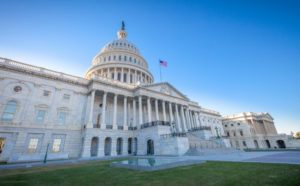President Biden is set to sign the final $858 billion fiscal year 2023 National Defense Authorization Act (NDAA) as well as a one-week stopgap funding bill, after the Senate passed both measures on Thursday evening.
The continuing resolution (CR) to keep the government open through Dec. 23 aims to give lawmakers more time to complete full FY ‘23 spending bills, with lead appropriators closing in this week on the final details for the legislation.

“This continuing resolution will keep the government open and functioning for an additional week, allowing us time to complete our work on FY ‘23 appropriations bills. We are making progress under our omnibus framework, but there’s still a lot of work to be done. We need to do our job and fund the government,” Sen. Richard Shelby (R-Ala.), vice chair of the Senate Appropriations Committee, said in a statement.
With a current government shutdown deadline looming on Friday, the House first voted 224 to 201 on Wednesday in favor of the CR before the Senate passed the stopgap funding legislation with a 71 to 19 vote on Thursday evening.
Before taking up the CR, leaders of the House and Senate Appropriations Committees announced a bipartisan, bicameral framework for an FY ‘23 omnibus bill had been agreed to, while details are still being worked on final spending levels.
“I am pleased to confirm that [Senate Appropriations] Chairman [Patrick] Leahy (D-Vt.), [House Appropriations] Chair [Rosa] DeLauro (D-Conn.), and I have reached a bipartisan, bicameral framework that allows us to begin the difficult work of reaching agreement across twelve separate bills. If all goes well, we should be able to finish an omnibus appropriations package by December 23rd,” Shelby said in a statement on Tuesday.
Air Force Brig. Gen Pat Ryder, the Pentagon press secretary, has said a situation where the department has to operate under a full-year CR would prohibit 192 new programs and 97 military construction projects from starting as well as halting production rate increases for 49 programs.
The Senate on Thursday evening also voted 71 to 19 on final passage of the $858 billion FY ‘23 NDAA, which was named for retiring Senate Armed Services Committee (SASC) Ranking Member Jim Inhofe (R-Okla.).
“This year’s NDAA includes targeted investments, needed reforms, and enhanced oversight. It addresses a broad range of pressing issues, from strategic competition with China and Russia, to disruptive technologies like hypersonics, AI, and quantum computing, to modernizing our ships, aircraft, and other equipment,” Sen. Jack Reed (D-R.I.), the SASC chair, said in a statement following the bill’s passage. “Naming this bill in honor of Ranking Member Inhofe is a fitting testament to his leadership and partnership on the Armed Services Committee, and his many decades of dedicated service to the people of Oklahoma, our servicemembers, and the nation.”
The final version of the annual defense policy legislation, which the House first passed with a 350 to 80 vote last week, includes a $45 billion topline increase and a provision that would allow the Pentagon to buy select critical munitions using multi-year contracts (Defense Daily, Dec. 8).
Before the vote on final passage, a proposal from Sen. Joe Manchin (D-W.Va.) related to reforming the process for permitting new energy projects and a measure from Sens. Ron Johnson (R-Wis.) and Ted Cruz (R-Texas) on reinstating troops who didn’t comply with the Pentagon’s Covid vaccine mandate were both voted down after each failed to receive at least 60 votes.
The compromise version of the NDAA removes the Pentagon’s vaccine mandate, while the department has noted that Defense Secretary Lloyd Austin remains supportive of keeping the measure in place (Defense Daily, Dec. 7).
Sens. Cory Booker (D-N.J.), Mike Braun (R-Ind.), Josh Hawley (R-Mo.), Mike Lee (R-Utah), Cynthia Lummis (R-Wyo.), Ed Markey (D-Mass.), Jeff Merkley (D-Ore.), Rand Paul (R-Ky.), Bernie Sanders (I-Vt.), Elizabeth Warren (D-Mass.) and Ron Wyden (D-Ore.) cast the 10 votes against the FY ‘23 NDAA.
Markey released a statement following the bill’s passage noting his opposition to the Congress’ move to approve authorizing a topline increase of $45 billion for defense, while noting his support for the “substantive funding to help the brave people of Ukraine defend their home, and for Taiwan to improve its self-defense.”
“This bill authorizes a whopping $857 billion for defense spending next year, $45 billion more than the President requested and many billions more than Congress has invested in addressing many of the biggest security concerns facing the American people—such as climate change, the opioid epidemic, poverty, hunger, and disease. Instead, it doubles down on the failed approach of pouring money into a bloated, inefficient, and sometimes counterproductive national security machine underwritten by an army of lobbyists and gold-plated contractors that fails to deliver on the needs of the American people. I simply cannot support it,” Markey said.